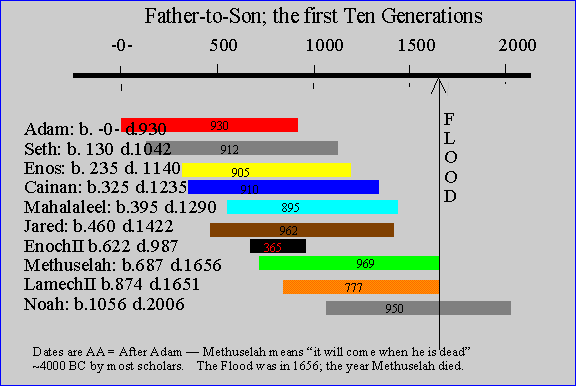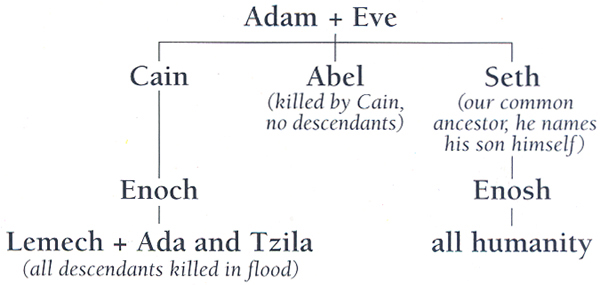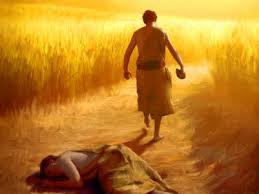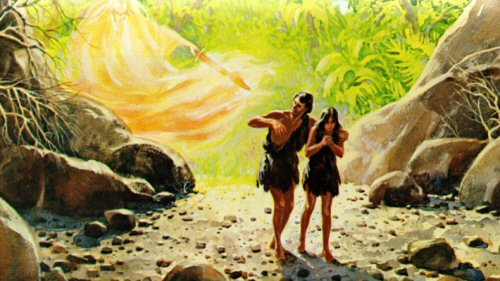Genesis 6-1-7
Session 4: Week 2
6 Now it came to pass, when men began to multiply on the face of the earth, and daughters were born to them, 2 that the sons of God saw the daughters of men, that they were beautiful; and they took wives for themselves of all whom they chose.
Some say sons of God were evil sons of Seth. This is what’s taught in most seminaries, but is inconsistent with other Old Testament scriptures. They teach that the daughters of Adam really mean the daughters of Cain, and the intermingling of these two lines brought about evil, but that’s not what scripture says. It says daughters of Adam. The Seth teaching emerged in the 5th century because the idea of angels procreating with humans is uncomfortable and unorthodox. Augustine embraced this view and that’s why it became the orthodox view.
The angel view is radical and unorthodox, but it seems to be what Scripture is teaching us based on other scripture verses using the words “sons of the gods.”
Job 1:6, 2:1
6 Now there was a day when the sons of God came to present themselves before the Lord, and Satan also came among them.
בְּנֵי הָאֱלֹהִים Sons of the Gods
2 Again there was a day when the sons of God came to present themselves before the Lord, and Satan also came among them to present himself before the Lord.
בְּנֵי הָאֱלֹהִים Sons of the Gods
In these verses angels were referred to as the sons of God in English.
The Hebrew for sons of God is בְנֵי-הָאֱלֹהִים Sons of the Gods. This translates as Sons of the gods.
Why do you think the English translators of the Bible changed the translation here?
Now let’s review our studies in Genesis 1:26-27:
ים (the letters yud and mem – pronounced eem) on the end of any Hebrew word makes it a plurality.
Because of this I used to think that Elohim referred to God as a plurality, but the Lord has exposed me to some other streams of thought that make more sense to me now, and I believe this passage fits into that same narrative.
For those of you new to our study, Dr. Michael Heiser is a biblical scholar and Hebrew language expert. He says Elohim couldn’t be referring to only the God of Abraham, Isaac and Jacob, based on Psalm 82. He believes that the word Elohim refers to a divine council. I tend to agree with him now.
Psalm 82 calls the council ( עֲדַת־אֵל , adath-el) and describes “gods” or spirit beings under the authority of Israel’s God.
Verse 1 states: “God (אֱלֹהִים , elohim) stands in the council of El/the divine council (עֲדַת־אֵל , adath-el); among the gods (אֱלֹהִים , elohim) he passes judgment.”
Dr. Heiser says that Elohim does not refer to the Trinity—because Psalm 82 describes how Israel’s God accuses the other אֱלֹֹהִים (elohim) of corruption and sentences them to die “like humankind.” God the Father would never accuse, sentence and condemn God the Son, or the Holy Spirit.
Let’s take another look at the “elohim” of the Hebrew Bible. They share a certain characteristic: they all inhabit the non-human realm. As created, the elohim are not part of the world of humankind, the world of ordinary embodiment. Dr. Heiser believes that Elohim—as a term—indicates residence, not a set of attributes; it identifies the proper domain of the entity it describes.
The idea that sons of the elohim took wives from the daughters of men goes against the natural order of God’s creation. This is the back story to what made everything so evil and why God had to bring the flood to destroy everything on the face of the earth.
We have to remember that the ancient Israel worldview was a supernatural worldview where concepts about the spirit realm weren’t as foreign as they are to our scientific minded age of logic and reasoning.
What difficulties do you think our age of reason presents us in the realm of accurately interpreting the Scriptures?
Genesis 6:3 And the Lord said, “My Spirit shall not strive with man forever, for he is indeed flesh; yet his days shall be one hundred and twenty years.”
The Hebrew for this verse is different. Let’s look at it:
| ג וַיֹּאמֶר יְהוָה, לֹא-יָדוֹן רוּחִי בָאָדָם לְעֹלָם, בְּשַׁגַּם, הוּא בָשָׂר; וְהָיוּ יָמָיו, מֵאָה וְעֶשְׂרִים שָׁנָה. | 3 And the LORD said: ‘My spirit shall not abide in man for ever, for that he also is flesh; therefore shall his days be a hundred and twenty years.’ |
So it seems from God making this statement that the sons of God procreating with the daughters of men was destroying the genetics of humankind and causing evil spirits to usurp God’s spirit in mankind; and because of that God shortened man’s lifespan.
What thoughts do you have about this?
4 There were giants on the earth in those days, and also afterward, when the sons of God came in to the daughters of men and they bore children to them. Those were the mighty men who were of old, men of renown.
| ד הַנְּפִלִים הָיוּ בָאָרֶץ, בַּיָּמִים הָהֵם, וְגַם אַחֲרֵי-כֵן אֲשֶׁר יָבֹאוּ בְּנֵי הָאֱלֹהִים אֶל-בְּנוֹת הָאָדָם, וְיָלְדוּ לָהֶם: הֵמָּה הַגִּבֹּרִים אֲשֶׁר מֵעוֹלָם, אַנְשֵׁי הַשֵּׁם. {פ} | 4 The Nephilim were in the earth in those days, and also after that, when the sons of God came in unto the daughters of men, and they bore children to them; the same were the mighty men that were of old, the men of renown. {P} |
Again, here we see a difference in the English and Hebrew words used. Giants as opposed to Nephilim. Naphal as a verb means to fall, so nephalim means the fallen ones. The nephalim became supermen who were very strong and very terrifying. They show up after the flood too.
All ancient cultures on earth have stories of giants, supermen or “gods”… Greek Titans were demi-gods who were partially celestial and partially terrestrial, they rebelled against their father Zues (not the creator) and were condemned to Tartarus (Greek for a dark abode of woe – the darkness, the pit, the unseen world) – “as far below Hades as earth is below Heaven” – in Homer’s Iliad.
Other cultures that have these kinds of legends include Sumer, Assyria, Egypt, Incas, Mayan, Gilgamesh, Persia, Greece, India, Bolivia, South Sea Islands and even the Native American Indians spoke of the Star people who came down; and who were 3 times the size of a man and were so swift and strong that they could run alongside a buffalo could take the animal in one arm and pull off a leg and eat it as they ran. Bones were found to support those stories.
If you want to read more about this Steven Quail has written a book called the Encyclopedia of Giants. Watching the You-Tube video that I’ve put for this week of the teaching by Chuck Missler about Genesis 6 you’ll see pictures of giants from that book.
There are hundreds of skeletons of giants and records of people who were 10-13 feet tall, but they’ve been covered up.
Remember that Scripture teaches that the inhabitants of the spirit world include Yahweh, the lesser gods of His council, angels, demons, and the disembodied dead. They may cross over into the human world—as the Bible informs us—and certain humans may be transported to the non-human realm (e.g., prophets; Enoch). But the proper domains of each are two separate and distinct places.
Within the spiritual world, as in the human world, entities are differentiated by rank and power. Yahweh is an elohim, but no other elohim is Yahweh. This is what an orthodox Israelite believed about Yahweh. He was not one among equals; He was unique. The belief that Yahweh is utterly and eternally unique—that there is none like Him—is not contradicted by plural elohim in the OT.
The ancient Hebrew sages understood the angel view of Genesis 6. The offspring of the angels and the woman were supernatural and unnatural. They were giants. Goliath was one of them. Think about this. Who built the ancient monuments that defy explanation? Stonehenge, the great pyramids; also there are palaces and temples with rocks the size of boxcars that come from miles away that no one knows how they’re built.
The new testament confirms the angel view three times:
Jude 6-7
6 and He has kept, with eternal chains in darkness for the judgment of the great day, the angels who did not keep their own position but deserted their proper dwelling. 7 In the same way, Sodom and Gomorrah and the cities around them committed sexual immorality and practiced perversions, just as angels did, and serve as an example by undergoing the punishment of eternal fire.
1 Peter 3:19-20
19 In that state He also went and made a proclamation to the spirits in prison[y] 20 who in the past were disobedient, when God patiently waited in the days of Noah while an ark was being prepared. In it a few—that is, eight people[z]—were saved through water.
2 Peter 2:4-5
4 For if God didn’t spare the angels who sinned but threw them down into Tartarus and delivered them to be kept in chains of darkness until judgment; 5 and if He didn’t spare the ancient world, but protected Noah, a preacher of righteousness, and seven others, when He brought a flood on the world of the ungodly;
You won’t understand what happened after the flood, and most of the prophecies in the entire old testament if you miss what’s going on here. This is an important foundation to understanding the old testament. Here are some examples. In the OT you’ll run into the Rephaim. The word means dead ones, or walking dead. These are the spirits of the dead nephilim who inhabit people in order to continue to try to thwart God’s plans on earth.
After the flood there are at least four tribes that God instructs Joshua to destroy: Rephaim, Emim, Horim, Zamsummim. It’s hard to relate to this unless you know this backstory and that there’s a gene pool problem.
Satan has always tried to oppose God’s plan. God’s plan was to give land to Abraham’s descendants through the line of Isaac. In those days he had those giants and these days he has the PLO and the UN. 😉 You can study the bible from cover to cover and see this played out. As God revealed in Genesis 3:15 that there would be a redeemer through the seed of the woman Satan knew he had to deal with the human race. In this passage it also talks about the seed of satan. This is what we’re seeing here in Genesis 6 and on throughout the Scriptures. In essence we are in a seed war.
How is this all challenging your view of the Scriptures?
Here are some attempts of satan to thwart God’s plans. Remember the destruction of the male line in the book of Exodus by Pharaoh? The population of Canaan (giants and the like) were put there strategically to keep the Israelites from entering the promised land. Once God reveals that a savior would come from David’s line there’s a constant attempts to wipe out those lines, but there’s always a servant or someone who hides one of the kids so God’s plan can play out. Even in the Persian empire Haman wants to wipe out the entire Jewish race to thwart God’s plans to keep the Messiah from returning. We see the same thing today.
Let’s look at Numbers 13 when Moses sent out the men to spy out the land of Israel.
30 Then Caleb quieted the people in the presence of Moses and said, “We must go up and take possession of the land because we can certainly conquer it!” 31 But the men who had gone up with him responded, “We can’t go up against the people because they are stronger than we are!” 32 So they gave a negative report to the Israelites about the land they had scouted: “The land we passed through to explore is one that devours its inhabitants, and all the people we saw in it are men of great size. 33 We even saw the Nephilim there—the descendants of Anak come from the Nephilim! To ourselves we seemed like grasshoppers, and we must have seemed the same to them.”
Og the King of Bashan (Deut. 3:12; Joshua 12) was known as the king of the giants.
Think about this: In the New Testament Mary (Miriam) is impregnated by the Holy Spirit in contrast to the daughters of Adam being impregnated by evil spirits. In light of our study today what new thoughts come to mind in relation to this?
Genesis 6:5-7
5 Then the Lord saw that the wickedness of man was great in the earth, and that every intent of the thoughts of his heart was only evil continually. 6 And the Lord was sorry that He had made man on the earth, and He was grieved in His heart. 7 So the Lord said, “I will destroy man whom I have created from the face of the earth, both man and beast, creeping thing and birds of the air, for I am sorry that I have made them.”
What’s very interesting is that Yeshua told us in Matthew 24:37-39 that as the days of Noah were, so shall also the coming of the Son of man be. What do the Golan Heights, the Gaza Strip and Hevron have in common? These were the areas that Joshua failed to exterminate the Rephaim. These are the modern day territories that remain in dispute within the land of Israel.
This passage of Scripture in Genesis 6 is often glossed over quickly when we read the Word; however I believe this is of utmost importance, especially as we get closer to the end of days. There are many teachers out there who examine this topic of the Nephilim and the role they play in the world in days gone by and the present and future.
What other thoughts do you have about all this?





